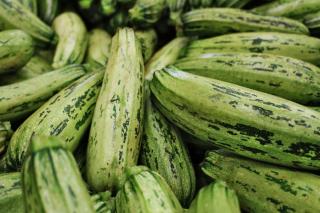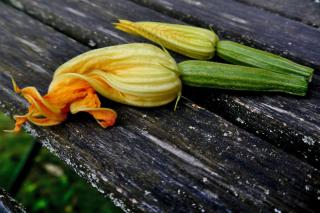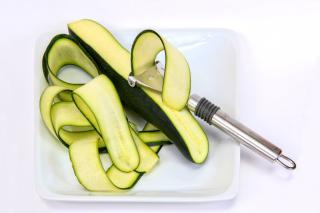

Zucchini or Curcurbita pepo belongs to the Cucurbitaceae family. This vegetable, full of health benefits, is actually a young squash, harvested before having matured completely.
There are many zucchini varieties. Different shapes like the ‘Ronde de Nice’ which is round, and also different colors such as the ‘Goldrush’ which is yellow; the ‘Grisette de Provence’ which is gray; the ‘Virginia white’ which is white; and also a series of green-hued fruits: the ‘Fordhook’, the ‘Grey Zucchini’, the ‘diamond’ or the ‘Black Beauty’.
Zucchini is a summer vegetable. It is grown in the South, in warm climates, because it loves sunbathed lands.
When added to our diets, zucchini is a true health booster. In cooking, both the vegetable and the yellow flower are much appreciated.

It was introduced in Europe thanks to the Spanish.
Zucchini itself was bred in the XVIIIth century. Indeed, Italians took up the habit of harvesting them before reaching full maturity. That was the start of zucchini.
In the middle of the XXth century, the Italian word “zucchini” was replaced in France by the word “courgette”, which means “little gourd”. It was initially called the “Italian gourd”.
Zucchini is filled with water, 95%, which makes it a great diuretic. It helps to purify renal routes.
It is also beneficial to the digestive tract. Fiber-rich zucchini improves intestinal transit. It is a laxative.
Zucchini is your special weight-loss partner. With very low calorie intake 13.3 kcal / 3.5 oz (100 g) and very little fats (0,1g), zucchini is a strong asset when working off those extra pounds.
Additionally, it serves to reduce cholesterol. Indeed, it prevents accumulation of bad cholesterol and thus reduces risk of cardiovascular disease.
Zucchini against cancer: Zucchini is a vegetable that has high antioxidant levels, like vitamin C which prevents appearance of cancer, protects the body and speeds wound-healing up.
It also has other vitamins in relevant quantities.
B group vitamins such as vitamin B9 support fetal development, as do vitamins B1 and B6.
Zucchini contains beta-carotene as well. This proto-vitamin A pigment is essential for eye health. It prevents photoreceiver degeneration in the macular area (AMD known to impact elderly persons).
Zucchini also has anti-inflammatory and astringent properties.
It impacts arterial blood pressure regulation. Once again, zucchini has preventive action against cardiovascular diseases.
Zucchini provides mineral and trace elements that are crucial to enable proper body functions: iron, calcium, potassium, copper, magnesium…
Zucchini peels placed as a mask around the eyes can reduce swelling and puffed-up eyes.
Zucchini is also great to soothe cutaneous stress such as sunburns. For that, place unpeeled zucchini slices on the vulnerable areas.
Chew zucchini seeds several times a day to fight bladder disorders.
Against digestive disorders, like constipation, drink a glass of zucchini juice. This is most effective when drunk in the morning before breakfast.
Crushed zucchini seeds are good for deworming.
Zucchini is recommended in case of anemia, asthenia, urinary and digestive disorders, asthma, arthritis, and arterial hypertension.
It isn’t contra-indicated for pregnant women, quite the opposite…

They can also be savored raw, sliced and added to mixed salads together with tomatoes and mozzarella cheese.
For appetizers, creamy zucchini and chives soup served cold in small clear glass will please eye and mouth alike!
Some even dare to cook zucchini for dessert! Imagine sweet zucchini pudding…
Vegetarian samoussas: In your preparation, grate one zucchini and one carrot. Add goat cheese and a teaspoon of mustard.
Zucchini tzatziki: replace cucumbers with zucchinis. Grate it, let it sweat on a paper towel, and then add 2 Greek yoghurts, garlic, mustard and olive oil.
Meat skewers: Alternate meat, bell pepper and zucchini cubes.
Zucchini leaves can also add variety to your mixed salads. Even zucchini flowers deserve a spot on your menu, either fried and frittered or raw to add a touch of color to your plates!

For hair, before washing, pour zucchini juice mixed with a teaspoon of olive oil and milk.
Keeping zucchini: They keep for a few days in a cool spot. The flowers, on the other hand, don’t keep at all. They must be used immediately.